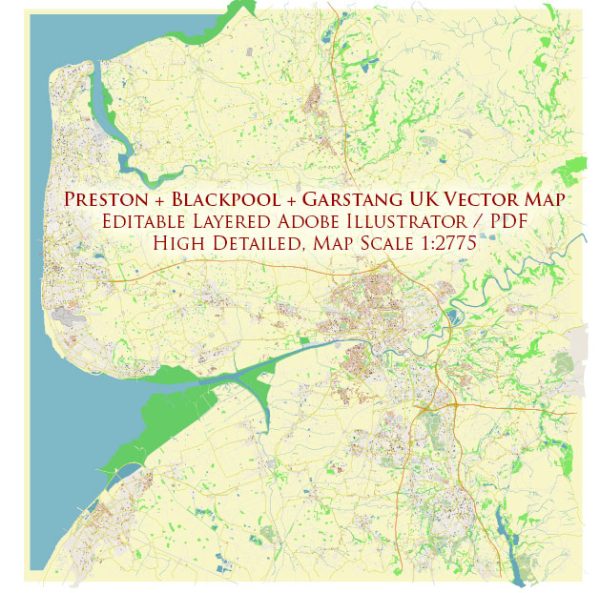The urban development history of Blackpool and Preston, two towns located in the county of Lancashire in the United Kingdom, is rich and diverse. Each town has its unique story and evolution.
Blackpool:
Blackpool is a seaside resort town on the Lancashire coast of the Irish Sea. Its history is closely tied to its development as a popular tourist destination, which began in the 18th century but truly took off in the 19th century with the arrival of the railway. Here’s an overview of its urban development:
- Early Years: Blackpool’s early history was centered around fishing and a few scattered hamlets. It was relatively unknown until the 18th century when it started to gain recognition as a healthy bathing spot.
- The Railway Era: The most significant development in Blackpool’s history was the arrival of the railway in the mid-19th century. This made it easily accessible to people from industrial towns like Manchester and Liverpool. As a result, the town’s population grew, and numerous hotels, entertainment venues, and promenades were built to accommodate the influx of tourists.
- Victorian Architecture: During the Victorian era, Blackpool saw the construction of many grand and ornate buildings, including the Blackpool Tower, which was inspired by the Eiffel Tower in Paris. The promenade and piers were also established during this time.
- Amusement and Entertainment: Blackpool became known for its entertainment offerings, including theaters, ballrooms, and amusement parks. The Pleasure Beach amusement park, established in 1896, is one of the most famous in the world.
- Post-World War II Development: After World War II, Blackpool continued to be a popular tourist destination. However, it faced economic challenges with the decline of traditional industries and competition from overseas travel. Efforts were made to diversify the economy, and tourism remains a vital industry.
Preston:
Preston is located inland and has a more varied history of urban development. Here’s a brief overview:
- Medieval Origins: Preston has medieval origins, with a history dating back to the Roman period. It was granted a Guild Merchant charter in 1179, which was a significant event in its history. This charter allowed for self-government and trade privileges.
- Industrial Revolution: During the Industrial Revolution, Preston became an important industrial center. It was known for its textile manufacturing, especially cotton mills. The population grew rapidly, and the town expanded to accommodate the workforce.
- Victorian Development: The Victorian era brought significant architectural development to Preston. Grand civic buildings, churches, and mills were constructed during this time, leaving a lasting legacy in the city’s architecture.
- Post-World War II Changes: Like many industrial towns, Preston faced economic challenges in the post-war period as traditional industries declined. Efforts were made to diversify the economy, including the development of the aerospace and technology sectors.
- Contemporary Preston: Today, Preston is a mix of historic and modern elements. It has a diverse economy, a university, and cultural attractions. Urban redevelopment projects have aimed to revitalize parts of the city while preserving its historical character.
Both Blackpool and Preston have distinct histories shaped by their geographical locations and economic activities. While Blackpool’s development is closely tied to its role as a tourist destination, Preston’s history is more rooted in industry and commerce. Both towns continue to evolve and adapt to the changing economic and social landscapes of the 21st century.


 Author: Kirill Shrayber, Ph.D.
Author: Kirill Shrayber, Ph.D.